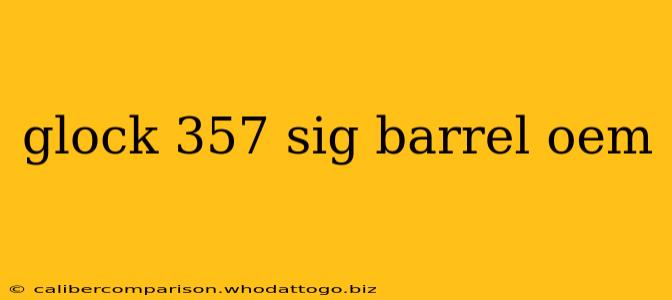Finding the right barrel for your Glock 357 Sig can significantly impact accuracy, reliability, and overall shooting experience. This guide delves into the nuances of Original Equipment Manufacturer (OEM) Glock barrels versus aftermarket alternatives, helping you make an informed decision.
Understanding Glock OEM Barrels
Glock's reputation for reliability stems partly from the quality of their OEM (Original Equipment Manufacturer) parts. Their factory barrels are precisely manufactured to exacting tolerances, ensuring consistent performance with factory ammunition. These barrels are typically made from high-quality materials like cold-hammer-forged steel, known for its strength and durability.
Key features of Glock OEM 357 Sig barrels:
- Consistent Accuracy: Manufactured to tight tolerances, resulting in predictable groupings.
- Reliability: Designed for seamless integration with the Glock platform, minimizing malfunctions.
- Durability: Built to withstand thousands of rounds, ensuring longevity.
- Warranty: Covered under Glock's warranty (if purchased as part of a complete firearm).
Exploring Aftermarket Glock 357 Sig Barrels
The aftermarket offers a wide array of Glock 357 Sig barrels, each boasting unique features and benefits. These barrels often cater to specific needs, such as enhanced accuracy, improved longevity, or customization options. However, it's crucial to choose reputable manufacturers to maintain reliability and safety.
Advantages of Aftermarket Barrels:
- Material Upgrades: Some aftermarket barrels utilize superior materials like stainless steel or even specialized alloys for enhanced durability and corrosion resistance.
- Accuracy Enhancements: Certain designs incorporate features like improved rifling or tighter tolerances for superior accuracy.
- Customization Options: Aftermarket barrels are available in various finishes (e.g., Cerakote), and some offer threaded barrels for suppressor use.
- Cost-Effectiveness: In some cases, aftermarket barrels offer comparable quality at a lower price point than OEM barrels.
Potential Drawbacks of Aftermarket Barrels:
- Compatibility Issues: Not all aftermarket barrels are created equal. It's essential to ensure complete compatibility with your specific Glock model to avoid malfunctions.
- Warranty Concerns: Using an aftermarket barrel might void your firearm's warranty.
- Quality Variations: The quality of aftermarket barrels can vary significantly depending on the manufacturer. Thorough research is crucial before purchasing.
OEM vs. Aftermarket: The Decision
The choice between an OEM Glock 357 Sig barrel and an aftermarket option depends largely on your priorities and budget.
Choose an OEM barrel if:
- Reliability is paramount: OEM barrels offer unparalleled reliability and seamless integration with your Glock.
- Warranty is a concern: Maintaining your firearm's warranty is essential.
- You prioritize simplicity: OEM barrels require no modifications or adjustments.
Consider an aftermarket barrel if:
- You need specific features: Aftermarket barrels offer options like threaded barrels, specialized finishes, or enhanced accuracy.
- Budget is a constraint: Some high-quality aftermarket barrels offer comparable performance at a lower price.
- You desire customization: Aftermarket options allow for personalized modifications to your firearm.
Conclusion
Selecting the right barrel for your Glock 357 Sig is a crucial decision. While OEM barrels provide consistent reliability and performance, aftermarket options offer potential upgrades and customization. Thoroughly research and compare different brands and models before making your purchase, ensuring compatibility and quality to maintain both performance and safety. Remember always to follow safe gun handling practices.

